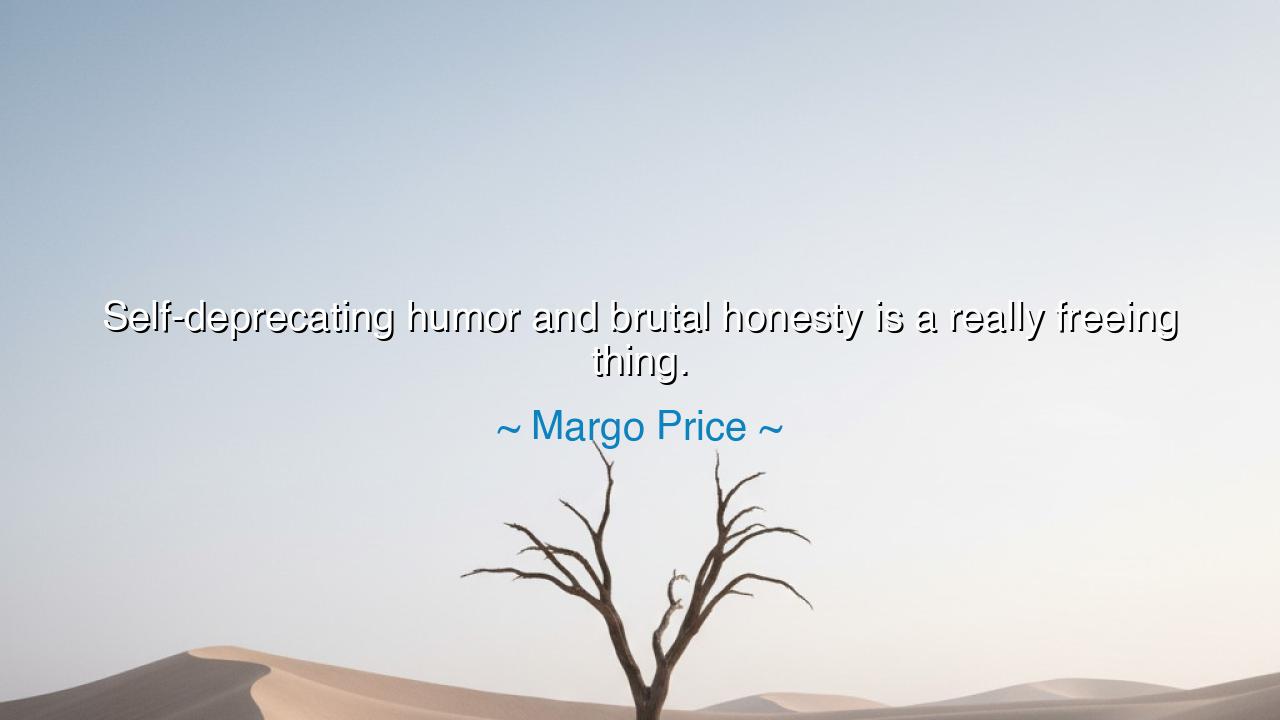
Self-deprecating humor and brutal honesty is a really freeing






"Self-deprecating humor and brutal honesty is a really freeing thing." These words, spoken by Margo Price, touch upon a profound truth about the human spirit: the act of acknowledging one’s imperfections and laughing at oneself can unlock the deepest form of freedom. In a world where we are often taught to hide our flaws and wear masks of perfection, there is power in self-deprecation and honesty. To be able to make light of one’s own shortcomings, to stand naked in the truth of one’s imperfection, is not an act of weakness, but one of great strength. It is in this vulnerability that we find the freedom to connect with others, to shed the weight of pretension, and to live more authentically.
In the ancient world, humility and honesty were seen as virtues of the highest order. Socrates, the great philosopher, was known not only for his wisdom but for his self-awareness and humility. He famously declared, “I know that I am intelligent, because I know that I know nothing.” This self-deprecating statement was not born out of a lack of confidence, but from a deep understanding that true wisdom comes not from pride, but from recognizing our own limitations. Socrates understood that in order to truly know the world, one must first know oneself, and this begins with an honest acknowledgment of one’s own flaws and imperfections. Margo Price’s words mirror this ancient wisdom—recognizing that the path to freedom lies not in hiding from our weaknesses, but in embracing them with humor and honesty.
Consider the example of Diogenes, the philosopher and cynic, who embodied both self-deprecation and brutal honesty in his actions. Diogenes lived a life that rejected society’s pretense and artifice, choosing instead to live simply and without shame. His famous act of entering a banquet hall with a lantern in hand and declaring he was looking for an honest man is a prime example of his humor and truth being intertwined. He did not seek to mock others for their flaws, but to expose the contradictions of a society that prided itself on wealth and status. Diogenes found freedom not in hiding behind social conventions, but in embracing the harsh truths of human nature with a sense of humor that both mocked and illuminated the folly of the world around him.
In more modern times, Mark Twain embodied the spirit of self-deprecating humor and brutal honesty in his writings and speeches. Known for his sharp wit, Twain’s humor often turned inward, using his own imperfections and flaws as a means to critique society and human nature. In works like The Adventures of Huckleberry Finn, Twain used humor to expose the hypocrisy and injustice of his time, often through the lens of his characters’ imperfections and mistakes. Twain understood that by laughing at himself, he could speak truths that might otherwise be too painful to address. His humor was not a means of hiding behind a facade, but a way to open up the conversation and invite others to see the world through a more honest, more compassionate lens.
The power of self-deprecating humor and brutal honesty lies in their ability to break down the walls we build around ourselves. Margo Price’s recognition of this freedom is a call to embrace the imperfections that make us human. It is easy to see vulnerability as a weakness, to believe that showing our flaws will lead to rejection or ridicule. But in reality, it is in accepting these imperfections, and even celebrating them with humor, that we allow others to see us for who we truly are. There is no need for pretense, for when we let go of the need to be perfect, we give others the permission to do the same. This is the power of honesty and humor: they free us from the burden of trying to live up to impossible standards and allow us to find connection in our shared humanity.
The lesson in Margo Price’s words is clear: true freedom comes not from hiding behind a mask, but from standing in the light of our imperfections. Self-deprecating humor allows us to laugh at ourselves, to embrace our flaws, and to connect with others on a deeper level. When we accept that we are not perfect, we open ourselves to the truths that bind us all. Brutal honesty, too, is not an invitation to harshness, but a call to authenticity—an invitation to speak the truth, even when it is uncomfortable, and to be vulnerable without shame. This is the path to freedom, for it is in our honesty and humor that we find our strength.
So, dear listener, take this wisdom to heart. Do not hide behind the facade of perfection. Embrace your imperfections and allow your humor to reflect the truth of who you are. Let your self-awareness and brutal honesty free you from the constraints of pretension and ego. When you can laugh at yourself, and face the world with the courage to be authentic, you will find that the world becomes a place of connection, not isolation. In this space, you will discover that the truest form of freedom comes not from hiding who you are, but in standing proudly and openly in your humanity.






AAdministratorAdministrator
Welcome, honored guests. Please leave a comment, we will respond soon